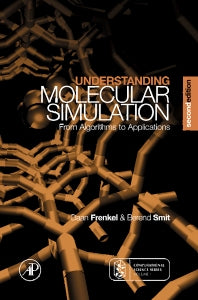Freshly Printed - allow 10 days lead
Couldn't load pickup availability
Understanding Molecular Simulation
From Algorithms to Applications
Daan Frenkel (Author), Berend Smit (Author)
9780122673511, Elsevier Science
Hardback, published 19 October 2001
0 pages
22.9 x 15.2 x 1.3 cm, 0.276 kg
"…brilliantly maintains a balance between explaining the physical phenomena and performing computations. Its marvelous writing style invites scientists and students to deepen their knowledge of MD simulations." --ComputingReviews.com, January 11, 2013 "... this book brilliantly lays down the scientific foundations of the simulational approach ..." --Prof. Kurt Binder in Physics World, 1997 "... a treasure. The book is a marvellous mix of just enough formalism with an informal and readable style, sufficient detail to understand methodological advances, appropriate mathematics ..." --Prof. Mark A. Ratner in Physics Today, 1997
Understanding Molecular Simulation: From Algorithms to Applications explains the physics behind the "recipes" of molecular simulation for materials science. Computer simulators are continuously confronted with questions concerning the choice of a particular technique for a given application. A wide variety of tools exist, so the choice of technique requires a good understanding of the basic principles. More importantly, such understanding may greatly improve the efficiency of a simulation program. The implementation of simulation methods is illustrated in pseudocodes and their practical use in the case studies used in the text. Since the first edition only five years ago, the simulation world has changed significantly -- current techniques have matured and new ones have appeared. This new edition deals with these new developments; in particular, there are sections on: Examples are included that highlight current applications and the codes of case studies are available on the World Wide Web. Several new examples have been added since the first edition to illustrate recent applications. Questions are included in this new edition. No prior knowledge of computer simulation is assumed.
1. Introduction Part I Basics 2. Statistical Mechanics 3. Monte Carlo Simulations 4. Molecular Dynamics Simulations Part II Ensembles 5. Monte Carlo Simulations in Various Ensembles 6. Molecular Dynamics in Various Ensembles Part III Free Energies and Phase Equilibria 7. Free Energy Calculations 8. The Gibbs Ensemble 9. Other Methods to Study Coexistence 10. Free Energies of Solids 11. Free Energy of Chain Molecules Part IV Advanced Techniques 12. Long-Range Interactions 13. Biased Monte Carlo Schemes 14. Accelerating Monte Carlo Sampling 15. Tackling Time-Scale Problems 16. Rare Events 17. Dissipative Particle Dynamics
Subject Areas: 3D graphics & modelling [UGK], Materials science [TGM], Atomic & molecular physics [PHM]


